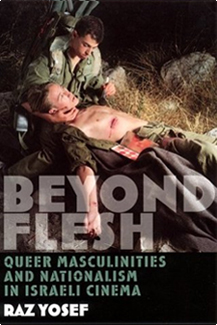
Beyond Flesh: Queer Masculinities and
Nationalism in Israeli Cinema
New Brunswick, New Jersey: Rutgers University Press, 2004.
The book explores Israeli cinema's role in the creation of national identity and the complex ways the marginalization of queerness became necessary to that goal. Zionism was not only a political and ideological program but also a sexual one. The liberation of Jews and creation of a new nation were closely intertwined with a longing for the redemption and normalization of the Jewish male body. That body had to be rescued from anti-Semitic, scientific-medical discourse associating it with disease, madness, degeneracy, sexual perversity, and femininity – even with homosexuality. The Zionist movement was intent on transforming the very nature of European Jewish masculinity as it had existed in the diaspora. Zionist/Israeli films expressed this desire through visual and narrative tropes, enforcing the image of the hypermasculine, colonialist-explorer and militaristic nation-builder, an image dependent on the homophobic repudiation of the "feminine" within men.
The book's critique of the construction of masculinities in Israeli cinema and culture along the axes of sexuality, race and ethnicity also serves as a model for the investigation of the role of male sexuality within national culture in general.
Purchase on Amazon.com
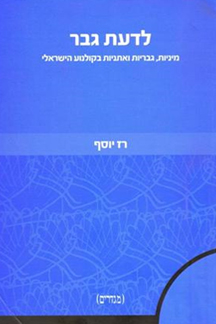
לדעת גבר: גבריות, מיניות ואתניות בקולנוע הישראלי
תל אביב: הוצאת הקיבוץ המאוחד, סדרת מגדרים, 2010
הציונות הייתה לא רק פרויקט פוליטי ואידיאולוגי אלא גם מפעל להסדרת המיניות שעסק באופן כפייתי בהמצאת ההטרוסקסואליות הגברית היהודית. המשימה הציונית לשחרור העם היהודי והשאיפה להיות אומה כשאר אומות העולם, הייתה כרוכה בפנטזיה על הגאולה המינית של הגוף הגברי היהודי. בשיח האירופאי האנטישמי של שלהי המאה ה-19 הגוף הגברי היהודי זוהה עם מחלות, שיגעון, ניוון, פרוורסיות מיניות, "נשיות" והומוסקסואליות. בהקשר זה יש להבין את הדרישה הציונית לשנות ולנרמל את הטבע של הגבריות היהודית האירופאית הגלותית. הקולנוע הציוני והישראלי ביטא תשוקה לאומית זו באמצעות ייצוגים ויזואליים ונרטיביים שונים, שאכפו את הדימוי של הגבריות הציונית החדשה המבוסס על הסילוק ההומופובי של ה"נשי" שבגבר. שיח הגוף של המפעל הציוני, כמו השיח הקולוניאלי והאוריינטליסטי, היה כרוך גם בפוליטיקה גזעית של היגיינה, השבחת הילודה ושיפור הגזע. באמצעות השיח על המיניות, ייצרה הציונות חברה מנורמלת, שלצד המגדר מובנה בתוכה גם שיח אתני, גזעני באופיו.
ספר זה מאתר ועוקב אחר ייצוגים של גבריות מאז סרטי החלוצים הציונים, שהופקו בפלשתינה בתחילת המאה ה-20, ועד אלה שמופיעים בקולנוע הישראלי העכשווי. כל אחד מחלקי הספר דן באופן ביקורתי בפרקטיקות הכינון והסימון של סוגי גבריות שונים בקולנוע הישראלי וביחסי הגומלין המבניים בין סוגי גבריות שונים אלה – יחסי גומלין שמתנהלים במסגרת מערכי שיח מרכזיים שעיצבו את תפיסת המיניות הגברית בישראל: השיח הציוני, שיח הצבא והמלחמה, השיח האתני המזרחי, והשיח ההומוסקסואלי. מחקר זה מציג לא רק דיון תיאורטי ביקורתי על הבניה של הגבריות בקולנוע הישראלי, אלא גם מציע מודל לחקירת התפקיד של המיניות בתרבות הלאומית באופן כללי, תוך אּתגור הנטייה הניכרת בדיונים תיאורטיים עכשוויים לעסוק בגזע, מיניות ולאומיות באופן נפרד.
Purchase on Kibutz Meuhad
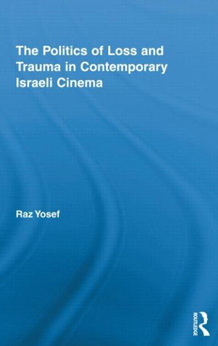
The Politics of Loss and Trauma in
Contemporary Israeli Cinema
New York and London: Routledge, 2011
The last decade has marked the growing visibility and worldwide interest in Israeli cinema. Films such as Walk on Water, Or, My Treasure, Beaufort and Waltz with Bashir have been commercially and critically successful both in Europe and the United States and have won a number of prestigious international awards. This book examines for the first time the new ideological and aesthetic trends in contemporary Israeli cinema. More specifically, it critically explores the complex and crucial role of Israeli cinema in remembering and restaging traumas and losses that were denied entry into the shared national past.
One of the most striking phenomena in contemporary Israeli cinema is the number and scope of films dealing with past traumatic events – events that were repressed or insufficiently mourned, such as the memory of the Holocaust, traumas from wars and terrorist attacks, and the losses entailed by the experience of immigration. Current Israeli cinema exposes and highlights a radical discontinuity between history and memory. Traumatic events from Israeli society's past are represented as the private memory of distinct social groups – soldiers, immigrants, women, queers – and not as collective memory, as a lived and practiced tradition that conditions Israeli society. This detachment from national collective memory pulls the films into a world marked by a persistent blurring of the historical context and by private and subjective impressions – a timeless world of dreams, hallucinations and myths. These groups feel duty-bound to remember the past, recasting repressed memories through the cinema in order to return and to give meaning to their identity.
Purchase on Amazon.com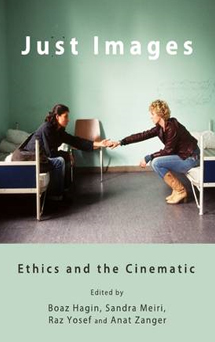
Just Images: Ethics and the Cinematic
co-editor with Boaz Hagin, Sandra Meiri, and Anat Zanger
Newcastle, UK: Cambridge Scholars Publishing, 2011
The book charts current developments within the field of ethics and the role it plays in the study of moving images. It is the first collection of essays of its kind that brings together articles by film and media scholars from three continents, and provides multiple points of engagement of film with present and past histories, politics, myth making, and with core aspects of human subjectivity. The essays cover a wide range of topics, such as the European Union; Europe during World War II and after; film genres; the Israeli Palestinian conflict; early American history, and recent catastrophic events. The collection includes an introductory chapter by Thomas Elsaesser as well as chapters by KristianFeigelson, Régine-Mihal Friedman, NurithGertz and Gal Hermoni, Anton Kaes, Gertrud Koch, Odeya Kohen-Raz, Lihi Nagler, Judd Ne'eman, Bill Nichols, and Janet Walker. The contributors offer different approaches to the issue of film and ethics and ask whether there are specific characteristics of the moving image, or of film scholarship, that relate to ethical issues; and how discussing the engagement of both narrative and documentary film with representations of the Other, trauma, terrorism, the Holocaust, and the Palestinian Israeli conflict may contribute to the re-shaping of past and current thoughts on these subjects.
Purchase on Amazon.com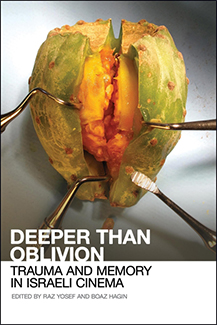
Deeper than Oblivion:
Trauma and Memory in Israeli Cinema
Raz Yosef and Boaz Hagin (eds.)
New York and London: Bloomsbury Academic, 2013
In this collection, leading scholars in both film studies and Israeli studies show that beyond representing familiar historical accounts or striving to offer a more complete and accurate depiction of the past, Israeli cinema has innovatively used trauma and memory to offer insights about Israeli society and to engage with cinematic experimentation and invention.
Tracing a long line of films from the 1940s up to the 2000s, the contributors use close readings of these films not only to reconstruct the past, but also to actively engage with it. Addressing both high-profile and lesser known fiction and non-fiction Israeli films, Deeper than Oblivion underlines the unique aesthetic choices many of these films make in their attempt to confront the difficulties, perhaps even impossibility, of representing trauma. By looking at recent and classic examples of Israeli films that turn to memory and trauma, this book addresses the pressing issues and disputes in the field today.
Purchase on Amazon.com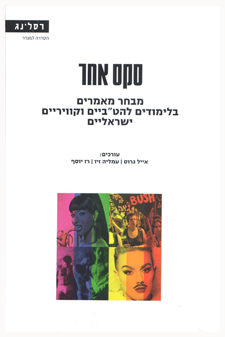
סקס אחר: מבחר מאמרים בלימודים להט"ביים וקוויריים ישראליים
(אייל גרוס, עמליה זיו, ורז יוסף (עורכים
תל אביב: רסלינג, 2016
תחום הלימודים הקוויריים קשור בטבורו לקהילת הלהט"ב שממנה צמח; הוא תורם להעצמתה של קהילה הסובלת עדיין מהומופוביה, סטיגמה ואפליה בתחומים רבים. ספר חלוצי זה, ראשון מסוגו בישראל, מנגיש היבטים מגוונים של חוויית החיים הלהט"בית המקומית ומנכיח את תרומתה הביקורתית של נקודת המבט הלהט"בית. הספר כולל מאמרים המבוססים ברובם על עבודות שהוצגו בכנסי "סקס אחר". המאמרים עוסקים בסוגיות של מיניות וזהות מגדרית בחברה הישראלית, בביקורת התרבות הישראלית מזווית קווירית מקשת רחבה של דיסציפלינות: היסטוריה, לימודי תרבות, משפטים, קולנוע, סוציולוגיה ועוד. הספר מחולק לחמישה שערים מרכזיים: השער הראשון עוסק במיניות ולאומיות, אחד הצירים המרכזיים של המחקר הקווירי בישראל. השער השני מציע מבטים היסטוריים על הבניית ההומוסקסואליות – או העדרה של הבניה כזו – בתקופות שונות ובשדות שיח הגמוניים שונים. השער השלישי עוסק באקטיביזם קווירי בשנות האלפיים, תוך כדי דיון בזיקות בין אקטיביזם להטב"י לאקטיביזם פוליטי בהקשרים אחרים. השער הרביעי דן בהבניה ובמשטור של הזמן והמרחב בשרות הנורמטיביות המינית והמגדרית, כמו גם במרחבים המציעים התנגדות למשטרי הנורמליות. השער החמישי פונה לסוגיות של זהות וייצוג; הוא דן בצורך של הקהילה הלהט"בית להתמודד עם העדר ייצוג תקשורתי או עם ייצוגים סטריאוטיפיים
Purchase on Resling

עקבות ימים שעוד יבואו: טראומה ואתיקה בקולנוע הישראלי העכשווי
נורית גרץ ורז יוסף
תל אביב: עם עובד ואוניברסיטת תל אביב, סדרת טיש לקולנוע וטלוויזיה, 2017.
בלב יצירות הקולנוע הישראליות בנות זמננו נמצאת התמודדות עם טראומות מן העבר; יצירות אלה חופרות כמו ססמוגרף רגיש אל תוך זיכרונותיה של החברה הישראלית ומעלות את מה שהיא השכיחה והשתיקה. הן עושות זאת בשפה פוסט-טראומטית מקוטעת, שאינה מתארת את הדברים במלואם, אלא מעלה חלקי סיפור שמוסתרים מאחורי תחפושות שונות. מחברי ספר זה מנסים ללכת בעקבות הזיכרון הישראלי, לגלות אותו בקולנוע הישראלי העכשווי ולחשוף עד כמה הוא מושפע מן הטראומות שחווינו כעם וכחברה. המחברים מבקשים להבין את ההיסטוריה מתוך הטראומה ולאתר את הפצעים הזועקים מתוך הזיכרון של החברה הישראלית ושל הקולנוע שלה. עוד הם מבקשים להראות כי דווקא השפה הפוסט-טראומטית המרוסקת והקטועה, המחזירה אל ההווה מראות וחוויות שלא עוכלו בתודעה ולא עובדו, היא שמוליכה את הסרטים אל העבר החבוי ומאפשרת התמודדות אתו. שפה זו אף עשויה להוביל להבנת העיוורון לטראומה של ה"אחר" ובתוך כך להבנת הטראומה של עצמנו, כקרבנות וכמעוולים כאחד.
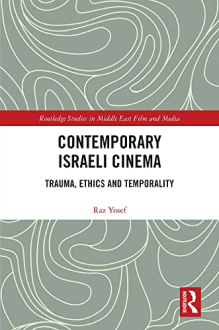
Contemporary Israeli Cinema:
Trauma, Ethics and Temporality
New York and London: Routledge, 2023
Through analysis of the complex discourse surrounding trauma and loss, this book provides a necessary examination of temporality and ethics in Israeli film and television since the turn of the millennium. The author examines posttraumatic idioms of fragmentation and incoherence, highlighting the rising resistance towards generic categories, and the turn to unconventional and paradoxical structures with unique aesthetics. Maintaining that contemporary Israeli cinema has undergone an ethical shift, the author examines the revealing traumas and denied identities that also seek alternative ways to confront ethical question of accountability. It discusses the relationships between trauma, nationalism, and cinema through the intertwined perspectives of feminism, queer theory, and critical race and postcolonial studies, showing how national traumas are constructed by notions of gendered, sexual, and racial identity. This innovative text highlights the complexities of discourse surrounding trauma and loss, informed by multiple categories of difference. Across each chapter various elements of Israeli film are explored, spanning from strategies used to critically examine victim-perpetrator dynamics, co-existence in temporal space, women’s cinema in Israel, displacement, and queer communities and identity. Beyond its direct contribution to cinema studies and Israel studies, the book will be of interest to trauma and memory studies, postcolonial studies, gender and sexuality studies, Jewish studies, Middle Eastern studies, and cultural studies.
Purchase on Amazon.com Home
Home